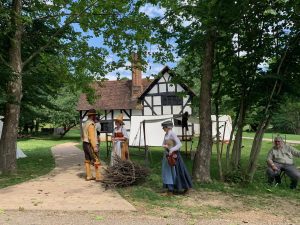Life
Time Travel Weekend
by
I’ve started trying to explore my new area. This weekend, I walked downtown to go to the farmers market and an art fair, but my big expedition was to the Frontier Culture Museum. This is a big, open-air exhibit on the edge of town that showcases the history of this region, from back when it was the American frontier. They’ve relocated actual historic structures and set up small farms for different historical areas. There’s a Native American farm, a cabin from the 1700s, an 1820s farmhouse, an 1850s farmhouse, a frontier schoolhouse, and an African-American church from around the end of the Civil War. It’s basically an opportunity to travel in time.
But the museum also gets into the cultures of the people who settled here, so there’s an Old World section with an Irish tenant farm from the early 1700s, a German farm, an English farm from the 1600s, and a West African farm. Part of these exhibits is not only the culture of the people who came from these places, but the reasons people left those places. For instance, the English farmhouse is a place a yeoman farmer would have lived, and that sort of person wouldn’t have had a reason to leave, but it was the kind of thing tenant farmers and laborers without land might have aspired to, so they’d have taken the opportunity to become indentured workers in the Virginia colony so that after their indenture time was up, they’d have their own land and would be yeoman farmers (and when the big landowners realized that they were going to run out of land if they kept having to give it to their workers, they turned to slavery for labor).
They grow flax there, so they can demonstrate the process of what it takes to process it into linen, and they raise sheep that they shear and then demonstrate wool processing. I also saw some cattle, pigs, chickens, and goats (and a barn cat).
They were doing a special Memorial Day event, so they had some historical reenactors and special experts on hand doing presentations. I went to the session a member of the Shawnee tribe did about Native American life in this area. They also had a smith working in the 18th century Irish forge, a demonstration of muskets by Revolutionary War reieactors, and a reenactment of the Enclosure Riots in England in the early 1600s.

There were some other activities, but I spent a lot of time in the forge, since one of the main characters in the next Rydding Village book is a smith, and I had to pet the dog the Shawnee man had because he looked so much like a dog I used to have (even acted exactly like my dog used to act when someone petted him) and I chatted with him for a while. I didn’t take a weapon and join in on breaking down the enclosures (I figured I’d let the kids have that fun), but I did watch and join in on the songs and cheers they taught us.
Actually, the Old World farmhouses were a lot like what I imagine for some of the houses in Rydding (though I picture more of the Cotswolds honey-colored stone), so the whole thing was very useful for giving me mental images and sensory details. I guess the excursion counted as work.
I ended up getting an annual pass because this is the kind of place you can’t really see all of in one visit, and they have a lot of really interesting sounding special events throughout the year. It’s also just a pleasant place to go walking, with some footpaths through wooded areas, and it’s near the Aldi, so I could pop by for a walk when I go grocery shopping. The history is one of the reasons I wanted to move to this area, so I’m going to have to explore all the historic sites. Later in the year, once I’m more settled, I’ll have to head to the coast and check out Williamsburg. I also need to plan a visit to DC and to see Mount Vernon, plus they’re getting pandas back at the National Zoo.
